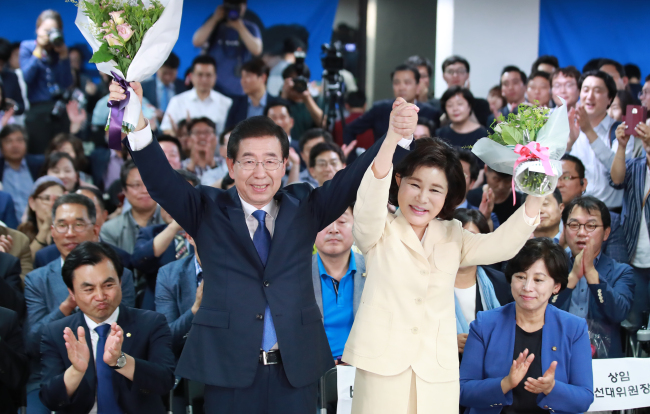The June 13 local elections ended with a sweeping victory by the ruling Democratic Party of Korea, and now the focus is on how it may benefit the next potential presidential candidates.

The ruling progressive party, whose members includes President Moon Jae-in, grabbed 14 of the 17 metropolitan mayor and governor posts, plus 11 of the 12 National Assembly seats in the by-elections that was held simultaneously.
While the elections were widely seen as an evaluation of the Moon administration’s first-year performance, it was also a race among potential presidential candidates, battling ahead of the next presidential election in 2022.
Some of the potential presidential candidates from the ruling camp who appear to be best positioned to take advantage of Wednesday’s elections include Seoul Mayor Park Won-soon who was elected for a record third consecutive term in the capital city, and Lee Jae-myung who won the race for Gyeonggi Province governor.
In the Seoul mayoral race, Park took the largely expected victory with 52.8 percent, far ahead of runner-up opposition rivals Kim Moon-soo from the main conservative opposition Liberty Korea Party and Ahn Cheol-soo from Bareunmirae Party.
The outcome granted Park another four years in office as the longest-serving head of Seoul that has a population of 10 million, whose post has largely been regarded as leading to the highest office.
For Ahn, a former medical doctor and IT entrepreneur who was widely lauded for his fresh and clean take on politics, the latest loss is a big disappointment, following his failed attempt in the previous presidential bid last year.
As one of the co-founders of the Bareunmirae Party, Ahn now faces mounting political pressure to retire from politics. Bareunmirae Party Co-chairman Yoo Seong-min resigned as his party failed to win any of the governor or parliamentary posts.
New Gyeonggi Province Mayor Lee won 56.4 percent in the elections despite allegations of an affair with an actress.
Lee, a former mayor of Seongnam, Gyeonggi Province, dubbed “South Korea’s Bernie Sanders,” gained popularity, during his presidential campaign last year, with his leftwing pledges to reduce the income gap as well as his active criticism of chaebol, the family-run conglomerates frequently embroiled in the country’s corruption scandals.
Incumbent Jeju Special Self-Governing Province Gov. Won Hee-ryong was re-elected with 51.72 percent of the vote. Won has enjoyed high approval ratings in the country’s southern resort island, promising its residents a paradigm shift to a carbon-free city and a new vision for economic growth.
Thanks to his environmentally friendly policies, more than half of the country’s electric vehicles are registered in Jeju that is famous for its natural surroundings.
Although he ran as an independent in the election after leaving the center-right Bareunmirae Party, Won is regarded as an iconic figure in the conservative bloc that is still reeling from the fall of the previous Park Geun-hye administration over the massive corruption scandal.
Won is the only rightwing candidate who was elected in the local elections outside of Daegu and North Gyeongsang Province, two traditional conservative strongholds.
By Bak Se-hwan (sh@heraldcorp.com)






![[From the Scene] Monks, Buddhists hail return of remains of Buddhas](http://res.heraldm.com/phpwas/restmb_idxmake.php?idx=644&simg=/content/image/2024/04/19/20240419050617_0.jpg&u=20240419175937)







![[From the Scene] Monks, Buddhists hail return of remains of Buddhas](http://res.heraldm.com/phpwas/restmb_idxmake.php?idx=652&simg=/content/image/2024/04/19/20240419050617_0.jpg&u=20240419175937)

![[KH Explains] Hyundai's full hybrid edge to pay off amid slow transition to pure EVs](http://res.heraldm.com/phpwas/restmb_idxmake.php?idx=652&simg=/content/image/2024/04/18/20240418050645_0.jpg&u=20240419100350)

![[Today’s K-pop] Illit drops debut single remix](http://res.heraldm.com/phpwas/restmb_idxmake.php?idx=642&simg=/content/image/2024/04/19/20240419050612_0.jpg&u=)